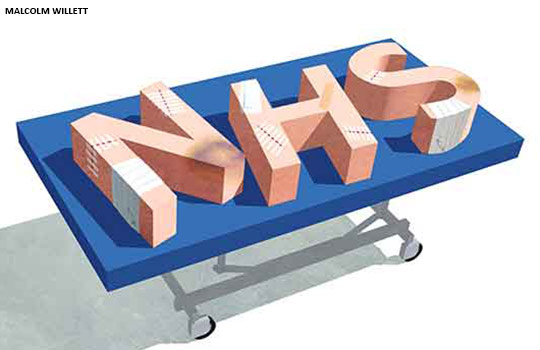This morning I’ve read a disappointingly shallow account in the Economist of the attempt to cure cancer and a quote from Schopenhauer that could be sent as a letter to the Economist in response to its articles on cancer. I’m an admirer of the Economist, but it’s in thrall to technology. I find the science […]
Category: Richard Smith
Richard Smith was the editor of The BMJ until 2004.
Richard Smith: Science fiction stories foresee a bleak future for healthcare

The rhetoric of the Academy of Medical Sciences, the medical royal colleges, and medical researchers is that the future of healthcare is bright. Personalised medicine is coming; diseases that are currently incurable will be cured; life expectancy will increase; big data will bring untold benefits; and the quality of care will steadily improve. But through […]
Richard Smith: Trying to make patient monitoring outside of intensive care widely used

Dinesh Seemakurty’s idea for a business came to him as he sat by his grandfather’s hospital bed in Kakinada, India. His grandfather had chronic obstructive pulmonary disease and had been treated initially in the intensive care unit. He’d been discharged, which Seemakurty and his family interpreted as a good sign, but during the night his […]
Disavowal: the great excuser that may destroy us

By Richard Smith and David Pencheon In 2007 Fiona Godlee, editor of The BMJ and somebody who has been concerned about the environment for at least 30 years, was outed as a “climate criminal” for flying too much. We too are concerned about the environment, but we both have cars, washing machines, dishwashers, and tumble […]
Richard Smith: A critique of Cyril Chantler’s plan for saving the NHS

Cyril Chantler—paediatric nephrologist, medical school dean, NHS manager, former chair of Great Ormond Street, and much else—is quite possibly the wisest man in the NHS. So we should play close attention to his plan—set out in one and a half pages—for saving the NHS. (Chantler submitted a longer version to the House of Lords report […]
Richard Smith: Advice to the NEJM on dealing with old influential articles with undisclosed COIs

At the end of last year JAMA Internal Medicine published a study that showed that the authors of two highly influential papers published in the New England Journal of Medicine in 1967 had undisclosed but important conflicts of interest. The two review papers demolished the idea that sugar might be important in coronary heart disease […]
Richard Smith: Journals, surgeons, and sexist language

Much to my amusement and countering the stereotype of surgeons, the Annals of Surgery has “following an uproar” retracted a paper that used only male pronouns to describe surgeons. It’s counter to the stereotype of surgeons because they still are overwhelming male and, in our imaginations if not reality, casually sexist. But there are an increasing number […]
Richard Smith: Humanity is dying—it’s time to switch to palliative care

We should accept that humanity is dying and switch from cure to palliation—just as wise patients do at the end of their lives. This is the core of an argument from Alex Jadad, a palliative care physician and magician, and Murray Enkin, a retired obstetrician in his 90s who has just survived a major heart attack […]
Richard Smith: The rotavirus story—countering the commonest cause of diarrhoea

“I’m not talking to you about Ebola or Zika virus but about a virus that everyone in this room has had and everyone of your children and probably all children in the world get in their first few years of life,” said Roger Glass, director of the Fogarty Institute, as he began his Wolfson Lecture […]
Richard Smith: What is science for?

Robert Boyle, Ireland’s most famous scientist, thought that the first aim of science was to develop practical applications to make life better. Earlier in his life he wrote in ecstatic terms about how science should glorify God. Boyle’s thinking on the functions of science underpinned the discussions at the Robert Boyle Summer School held in […]